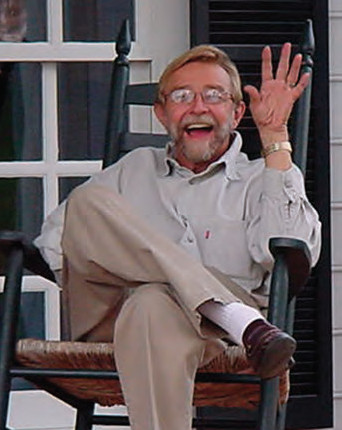
Thomas James Matthews was born in Denver, Colorado on April 4, 1945 and grew up in Evergreen, Colorado. After high school, he left Evergreen to attend Colorado State University in Fort Collins, majoring in chemistry. He pursued graduate studies at the University of Missouri where he received his Ph.D. in Biochemistry in 1971. Following post-doctoral training in Dr. Roland Rueckert’s picornavirus laboratory at the University of Wisconsin, Tom came to Dani Bolognesi’s laboratory in the Department of Surgery at Duke in 1977. Tom’s initial research investigated the use of MuLV antigens expressed on the surface of tumor cells as model tumor-associated antigens in the evaluation and development of novel cancer immunotherapy strategies. In 1984, his attention turned to HIV-1, where he focused on envelope structure/function studies that resulted in his pivotal description of the principal neutralization domain residing in the V3 loop of gp120. His search for potential vaccine targets within the viral envelope led to his discovery of a peptide from gp41 (DP-178) that was extremely potent in blocking the process of viral entry. Tom and Dani founded the company Trimeris in order to explore the therapeutic potential of this new class of antiviral compounds. As Senior Vice President of Research & Development, Tom’s efforts led to the licensure of Fuzeon® in March of 2003. Tom continued his active pursuit of improved entry inhibitors until his untimely death on December 20, 2004.
Tom is survived by his wife Ginger, three beloved daughters Shandra, Terri, and Cynthia, six grandchildren, as well as his brother Gary and sister Susan.
Tom was a consummate scientist who was driven by his thirst for discovery, creativity, and the challenges brought about by new insights. Life itself was a continuing adventure for him, whether it involved his many hobbies, Duke basketball, or his beloved family and friends. We are all far better for having known him, and dedicate this lecture series to his life in hopes that it will serve as an inspiration to present as well as future generations of scientists.

2024 Lecture
Molecular Mechanisms of CD8 T-Cell Exhaustion
E. John Wherry, Ph.D.
Watch the lecture video here. (Duke ID required)
2020 Lecture
PD-1 Blockade in Cancer Therapy: Mechanism-Based Biomarkers and New Frontiers
Suzanne Topalian, M.D.
Watch the lecture video here. (Duke ID required)
2016 Lecture
Nature, Nurture and the T Cell Receptor Repertoire
Mark M. Davis, Ph.D., Stanford University/HHMI
2014 Lecture
Cancer Immunotherapy with CAR T Cells
Carl H. June, M.D., The University of Pennsylvania
View lecture photos here.
2013 Lecture
Ending the HIV/AIDS Pandemic: From Scientific Advances to Public Health Implementation
Anthony S. Fauci, M.D., NIAID/NIH
View lecture photos here.
2010 Lecture
Hepatitis C: Unraveling the Mystery and Progress Towards a Cure
Charles M. Rice, Ph.D., The Rockefeller University
View lecture photos here.
2009 Lecture
A Personal Journey with Viruses and Blood Cells:
A Reflection on a Career in Medical Science
Robert C. Gallo, M.D., University of Maryland School of Medicine
View lecture photos here.
2008 Lecture
Search for the Origin of Adaptive Immunity
Max D. Cooper, M.D., Emory University School of Medicine
2007 Lecture
HIV Vaccine Design and the Neutralizing Antibody Problem
Dennis R. Burton, Ph.D., The Scripps Research Institute
2006 Lecture
Memory CD8 T-Cell Differentiation During Acute Versus Chronic Viral Infection
Rafi Ahmed, M.D., Emory School of Medicine
Inaugural Lecture, 2005
The HIV-1 Envelope Glycoproteins: A State of Stealth
Joseph Sodroski, M.D., Harvard School of Public Health